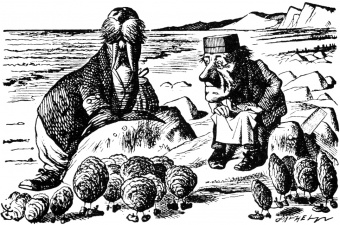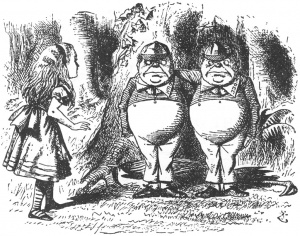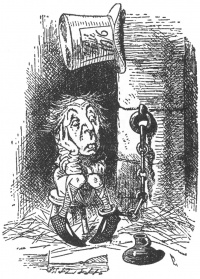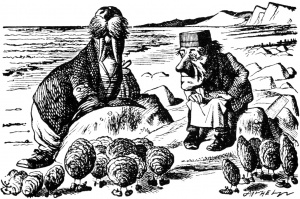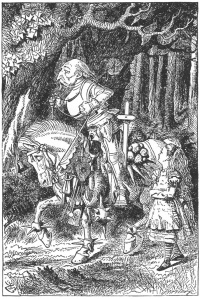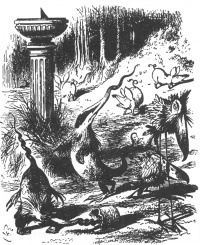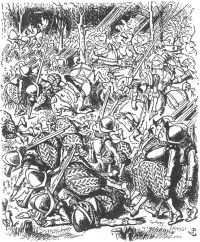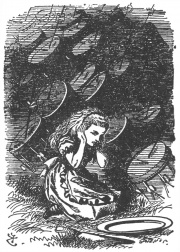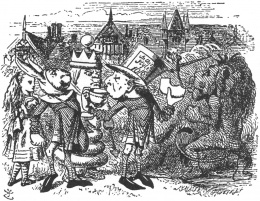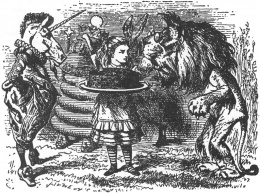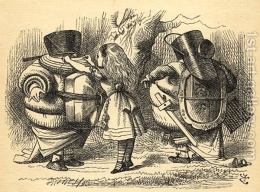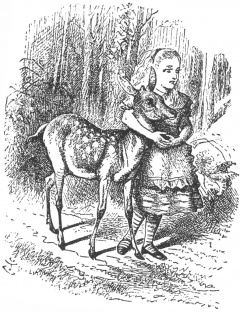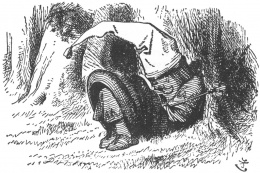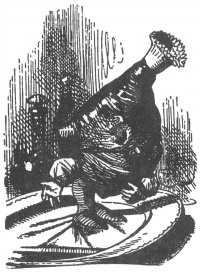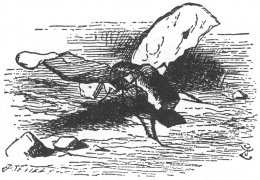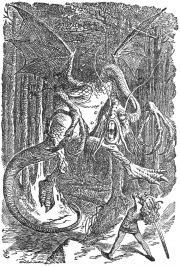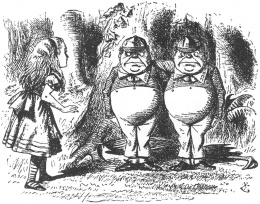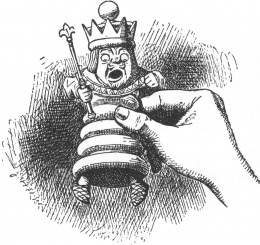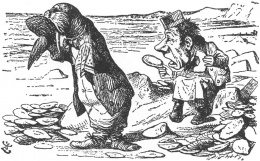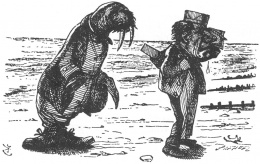Chapters
Wikipedia through the Looking Glass is the working title for a book about Wikipedia, by Edward Buckner, co-written with Eric Barbour.
- I think this is going be a blockbuster, not just because it is the first critical book about Wikipedia to be published, but because it is so well-written and well-researched. It’s going to embarrass a lot of people who richly deserve to be embarrassed. The trouble for the defenders of the Wikipedia establishment is that the evidence itself, the facts themselves, are damning. – Larry Sanger (co-creator of Wikipedia)
It is the story of the dark side of Wikipedia. The book reveals, for the first time, the truth behind the origin of Wikipedia, its spectacular growth into one of the world's most visited websites, the struggles to control it, and the covert agenda and political ambitions of those who now run it, including its relations with vested interests such as the technology and public relations industries. It is more than just a catalogue of the scandals – sexual, ethical and financial – that have afflicted Wikipedia from its beginning. The book aims to explain why Wikipedia is the way it is, through an examination of its origins, its history, its design, its governance and culture.
The book relies on extensive research, previously unpublished archive material, interviews with supporters - including those closest to Wikipedia's co-founder Jimmy Wales - and critics, such as disaffected Wikipedians who lost power in the successive purges of its leadership. The people and the events that shaped Wikipedia are tied together in a fast-paced narrative that takes us from Chicago to San Diego, San Francisco, Tampa and London, England.
Contents
- 1 The authors
- 2 The market
- 3 Sources
- 4 Style and approach
- 5 Reactions
- 6 Chapter overview
- 6.1 Chapter 1
- 6.2 Chapter 2
- 6.3 Chapter 3
- 6.4 Chapter 4
- 6.5 Chapter 5
- 6.6 Chapter 6
- 6.7 Chapter 7
- 6.8 Chapter 8
- 6.9 Chapter 9
- 6.10 Chapter 10
- 6.11 Chapter 11
- 6.12 Chapter 12
- 6.13 Chapter 13
- 6.14 Chapter 14
- 6.15 Chapter 15
- 6.16 Chapter 16
- 6.17 Chapter 17
- 6.18 Chapter 18
- 6.19 Chapter 19
- 6.20 Chapter 20
- 6.21 Chapter 21
- 6.22 Chapter 22
- 7 See also
The authors
Edward Buckner (main writer) is a medieval scholar based in London. He no longer teaches, but continues to write – he is the main author of Time and Existence, a book about the life and philosophy of the medieval theologian John Duns Scotus (1265-1308) to be published by the Catholic University of America Press in September 2014. The book received warm praise from the CUA reviewers for the exceptional clarity with which it handled a difficult subject, and for the comprehensive research that underpinned it.
Eric Barbour (researcher and advisor) is the former co-founder of Vacuum Tube Valley magazine, and has won awards for his writings on the early history of electronics. He is the owner and founder of Metasonix, the world’s only company making music synthesizers out of vacuum tubes. He lives in California.
Why did they write it?
- Ed: "As a philosopher, I am fascinated by the fact Wikipedia exists at all. It's an incredible thing – one of the largest websites in the world built almost entirely by amateurs. So the purpose of the book is partly to give an explanation of Wikipedia. But I also wanted to entertain. My entire published output has been to a small, specialised audience, and I wanted to write something that would have a broader appeal. Meeting Eric and others with inside knowledge of Wikipedia gave me that chance".
- Eric: "I edited Wikipedia back in 2004-2005, and gave up after realizing what a magnet for fools it was. When a cartoonist friend begged me to recreate his Wikipedia bio at the end of 2007, I tried -- and found myself crashing into a dark glass wall made of hostility and madness. This book gives the average Wikipedia user a chance to peer behind the glass."
The market
The book is partly a history of Wikipedia, and so covers some of the ground covered by The Wikipedia Revolution by Wikipedia insider Andrew Lih (Hyperion, 2009), and How Wikipedia Works by insiders Ayers, Matthews, and Yates (San Francisco 2008).
However, it will be the first book to take a critical and analytical view of Wikipedia. Its web-sceptical point of view is close to Andrew Keene’s The Cult of the Amateur (Random House 2011), a critique of the ‘Web 2.0’ philosophy of user-generated content, and of the hype surrounding it, as well as Free Ride, by Rob Levine (Doubleday 2011), a polemical and fierce attack on the ideology of the ‘Free Culture’ movement. Jaron Lanier has been an influence, as well as Evgeny Morozov (author of The Net Delusion).
It also includes material omitted from previous books, such as the influence of the pedophile movement and the pornography industry, and archive material once thought lost.
Sources
Sources The main sources for the book were:
(1) Interviews with people close to the project, some of them Wikipedia insiders, some of them disaffected ex-Wikipedians. These include ‘checkusers’ (a small group of highly trusted Wikipedians who are responsible for the internal and external security of the website), former and current administrators, committee members, and former Bomis staff, including a former deputy of Jimmy Wales.
(2) Non-publicly available archives, including a large archive of private emails 2000-2002 from the Nupedia mailing list, once thought lost, casting doubt upon Wales’ claims to be the founder of Wikipedia, as well as a leak of confidential emails from the Wikipedia Arbitration Committee mailing list.
(3) Publicly available archives and the Wikipedia archives. (Wikipedia has an archive system that records all user interactions on the encyclopedia and other websites under its control since 2001, as well as a collection of mailing lists).
(4) Both founders of the Wikipedia project. Larry Sanger has been involved from the start, and has seen and advised on much of the draft material. Jimmy Wales has been involved since 2011.
Style and approach
The book is written in a narrative style, to hold the interest of a wide audience, with details of technology kept to a necessary minimum. Vivid real-life examples are used to explain some of the basic concepts underlying Wikipedia. The first chapter begins on the floor of the Chicago Mercantile Exchange, where a young Jimbo starts work as a trader. The commodities trading floor and its decentralised system of control is used to illustrate Jimbo’s ideas about how a user-built encyclopedia could be developed without central control. At the same time, it is faithful to the facts, and is supported by comprehensive and meticulous research.
The narrative is established in ‘meatspace’ rather than ‘cyberspace’, locating each chapter in a specific time and place. The chapter on ‘Essjay’ (an unemployed editor who rose through the ranks of Wikipedia by pretending to be a theology professor) starts off on the banks of the river Ganges in India where Wales is between speaking engagements, and follows him on his travels as the scandal breaks. The chapters on Bomis are set in the company’s offices in San Diego.
For stories which have been covered before, such as the dispute between Sanger and Wales over the origin of Wikipedia, or the Essjay scandal, we have taken a fresh view, as well as sourcing material previously unavailable. On the dispute about who founded Wikipedia, we used leaked or unpublished archives that portray a different picture from the official version.
There are many hitherto unpublished stories, such as the ‘Anvil email’ (a senior Wikipedian blackmailed an editor into confessing use of sockpuppet accounts) and the Morrow affair (Wikipedia commissioned a secret private investigator report into the activity of a stalker). Wherever possible we have used information from sources not in the public domain, such as leaked correspondence, unpublished archives, and interviews with disaffected senior administrators.
The individual chapters are structured as self-contained stories or ‘moral tales’ that are engaging and accessible to a non-technical audience. The chapter on the Wikipedia pedophile campaign starts in the highlands of Mexico where the ringleader of the campaign is being pursued by the US federal authorities. The story runs in parallel with the hunt for him and his fellow conspirators on Wikipedia, culminating in his arrest and subsequent 20 year imprisonment in in 2008, and the simultaneous (secret) blocking of the conspirators on Wikipedia.
Reactions

Larry Sanger:
- The book, from what I’ve seen of it, is FANTASTIC. It’s a page-turner, for me anyway, and it will make a huge splash. The narratives are extremely well-drawn, the points extremely salient. It does not come across as a mean-spirited polemic. It reads more like a somewhat biased but well-written journalistic type piece. It doesn’t lay out a systematic case for anything (as far as I can tell so far). It simply tells a series of stories, each with a moral or two to them. They’re well-researched.
- While it is polemical, and has a definite point of view, it is also an excellent piece of research. My general impression is that they do not draw conclusions where unwarranted; they stick to the evidence. The trouble for the defenders of the Wikipedia establishment is that the evidence itself, the facts themselves, are damning.
- I think this is going be a blockbuster, not just because it is the first critical book about Wikipedia to be published, but because it is so well-written and well-researched. It’s going to embarrass a lot of people who richly deserve to be embarrassed”.
Andreas Kolbe, longtime Wikipedia editor and critic:
- Readable, engaging, makes you want to turn the page and read on ... which is quite an achievement for something about Wikipedia.
Scott "Hex" Martin, longtime Wikipedia administrator:
- This book is set to be the Hollywood Babylon of Wikipedia, except the scandalous behavior cataloged within will be unquestionably real.
Chapter overview
The book is organised in twenty one chapters. It covers the origins of Wikipedia in the late 1990s, the development of its governance and ideology, its growth into the sixth largest website in the world, and the story of many of the incidents and scandals that have dogged it to the present day.
The first part covers the birth and early years of Wikipedia, and the events that determined its design, its governance and its ideology. The rest is about the problems its design has led to, including the various scandals that have afflicted it, such as the pedophile campaign, the Seigenthaler affair, and the ‘Essjay affair’. It examines the problem of the mentally ill people who work on Wikipedia, and how the Wikimedia Foundation has covered this up to support Wikipedia membership levels. The ‘Anvil email’ is a hitherto untold story about how Wikipedia and the Wikimedia Foundation blackmailed a UK civil servant.
It investigates the question of whether Wikipedia is reliable or not, and whether ‘crowdsourcing’ will ever write The Critique of Pure Reason. The later chapters tackle the parallels between Wikipedia and the wider phenomenon of 'Web 2.0'.
Chapter 1
He had arrived. Heavy men – he could see no women - with voices like foghorns, in serried ranks of striped jackets. Waving, shouting, bellowing with mighty force, arms perpetually raised as if in prayer to the god of money. Hands inward, as though calling the children from the garden – buy. Hands out, as though warding off the devil – sell. The number of fingers signified the last digit of the amount bid or offered. Mine at five ! Yours at two! The waves of buying and selling crossing the market caused a human ripple of activity across the floor. It was simultaneously repulsive and compelling, like watching the agony of some animal, crying in some deep pain known only to God. Or like one of the circles of hell. Lasciate ogne speranza, voi ch’intrate.
27 year old Jimmy Wales takes his first job as an ‘upstairs trader’ at the Chicago Mercantile Exchange. The chaos of the trading floor vividly illustrates to him how order can emerge from a system with no centralised governance or design, as well as suggesting a means for ordinary people to acquire wealth.
Jimbo is deeply impressed by the ideas of economist and philosopher Friedrich August Hayek, the champion of free market thinking and the arch-opponent of the ideas of the British economist John Maynard Keynes. Hayek had grown up in the era when communism was still taken seriously by the intellectual establishment, and when the idea of central planning dominated economic and government thinking. Hayek argued that central planning will only work if the planners have all the relevant data. But they don’t have all the relevant data, for there is also a body of very important but unorganized knowledge, of the particular circumstances of time and place, which is only available to those who are there at the right time, and the right place.
Circumstantial knowledge is never given to a single mind to work out the implications. It never exists in concentrated or integrated form, but is dispersed among different individuals, in a disorganised and unsystematic and often contradictory way. Hayek quotes Alfred Whitehead: “It is a profoundly erroneous truism, repeated by all copy-books and by eminent people when they are making speeches, that we should cultivate the habit of thinking what we are doing. The precise opposite is the case. Civilization advances by extending the number of important operations which we can perform without thinking about them.”
Jimbo sees this as a blueprint for an online encyclopedia, written by thousands of volunteers, without coordination or planning.
Chapter 2
Jimmy set up Bomis in November 1996. Tim Shell, a gifted computer scientist and fellow member of the ‘Objectivism’ mailing list was staying in Chicago and trying to break into the dotcom business, which was just beginning to take off. They started the Bomis web site, for ‘Bitter Old Men in Suits’, as an ‘online marketing venture’ developing ‘new and innovative ways to sell products over the Internet’.
Jimbo foresees the internet as central to technological development in the forthcoming century (“I’m the new economy -- I’m the internet”).With the savings from his work as a futures arbitrageur, he sets up a small internet company: ‘Bitter Old Men in Suits’ or Bomis. Bomis is a ‘web ring’, a sort of telephone directory for the web which will soon be made obsolete by the new search engine Google.
The only business model that works is softcore pornography. Bomis starts with a regular “Bomis Report”, with Baywatch Babes Ring rankings. Pamela Anderson is first with 10,429 visits on January 23 1998, Donna D’Errico some way behind with a mere 3,546 visits. Later, the site features links to hardcore pornography (‘Cum guzzling sluts with their mouths full’).
Bomis becomes successful enough to support Jimbo's idea for an online reference work that will attract legitimate forms of advertising. In 1998 he moves from the cold of Chicago to set up shop in San Diego.
Chapter 3
Larry was working on a successor to his blog about the Y2K or ‘millenium bug’ problem (‘a source of a bit of embarrassment on my part and good-natured ribbing on the part of friends and family’), and had e-mailed Jimbo and some other acquaintances to get feedback on an idea for a blog. To his surprise, Jimbo emailed back, describing an idea for a free enyclopedia. He wanted a philosopher to lead the project, making it a condition of employment that Larry finish his Ph.D.
In early 2000, Jimbo hires philosophy PhD Larry Sanger to set up the online encyclopedia Nupedia. The project will use the expertise of academic experts and specialists to build ‘an ever expanding Open Source encyclopedia’. The Nupedia review process is long and cumbersome, and there are not nearly enough articles, nor do the academics want to write short informative articles about specific subjects (such as small American towns).
By the end of 2000, it is obvious to Larry and Jimbo that the production process is too slow, and they have no satisfactory method for using volunteers. They have only twenty six articles in progress, with only fourteen articles completed, all of them ‘deep’, none of them ‘specific’. Jimbo appeals to the principles that, to his mind, underpin the success of the Linux operating system. Linux dominates the world not by having a small group of highly talented programmers toiling away in obscurity. Its success depends on being open and with 'zero regard' for qualifications or credentials. “If you contact the manager of a truely [sic] open project, volunteering to help, the first question back will not be ‘what are your qualifications?’ The first question will be ‘when can you send in some code?’”
Chapter 4
The holidays were over, and Ben Kovitz, a friend of Larry’s from his philosophy mailing lists in the mid-90s, who had recently moved to the area, met up with him on Tuesday January 2, 2001, to eat at an unprepossessing taco house at 1932 Balboa Avenue, just around the corner from the old Pacific Beach office. The stand had no name, just the words “MEXICAN FOOD” written on a window.
Ben tells Larry about a new piece of software called a wiki, which allows for rapid open development. Frustrated by the lack of progress with Nupedia, Larry proposes using a wiki. But the academics are sceptical. They cannot see how a wiki, which does not identify the main author of an article, can reward them with the status and reputation necessary to their academic career.
Michael Kulikowski, a professor of medieval history, is absolutely opposed to the idea. “Gimmicks are no good substitute for the academic seriousness with which this whole project began”. Carl Anderson, Professor of Classical Studies, Michigan State University, is even more vocal. "The question seems to me not whether we are stodgy -- it is whether we want to invest our time in silliness”.
Jimbo and Larry separate the wiki from Nupedia, calling it ‘Wikipedia’, and the online encyclopedia is born.
Chapter 5
Wikipedia had grown fast in two months. Larry motivated people to work on an encyclopedia, not a dictionary, and tried to discourage them from using the project as a platform for debate. The Wiki proved easy to use, unlike the cumbersome software used by Nupedia. The radical collaboration which it enabled made it possible for work to move forward on all fronts at the same time, and to avoid the bottleneck of a single author working on a single article. By Thursday, March 22, they had 2,953 Wikipedia pages, of which 1,816 looked relatively substantial.
Although the academic specialists do not buy into the idea of the wiki, it soon attracts interest from the web community, especially when the project is mentioned in the high profile hacker website ‘Slashdot’. In 2001, the cause of ‘free software’ is starting to turn into an international movement. Slashdot is its parish magazine. The Slashdotters are inspired by the success of the open software project Linux, developed on the principle that ‘many eyeballs make all bugs shallow’, and by the collectivist philosophy of Richard Stallman, who once took his ideas to Russia, only to be told “This sounds too much like communism to be successful here”.
Stallman believes that software users must have the freedom to run it and distribute it, or a modified version of it. If you can’t do what you want with the software, the software, not you, is controlling the program. But that is a form of subjugation, and all subjugation is tyrannical, he says. Large corporations such as Microsoft are demonised by the free software movement. If you don’t have the appropriate freedom, says Stallman, “you are being divided and dominated by somebody”.
The newcomers and the academics do not get on. Michael Witbrock is dismissive. “Wikipedia is not dissimilar from a newsgroup circa 1990. Entertaining to spend time contributing to. Containing occasional words of wisdom. And of little lasting value”.
Chapter 6
Diogenes, filthily attired, paced across the splendid carpets in Plato’s dwelling. Thus, said he, do I trample on the pride of Plato. Yes, Plato replied, but only with another kind of pride.
After further publicity in Slashdot, Wikipedia attracts increasing attention from the motley bunch of anarchists, radicals and extremists who believe that all knowledge should be free, and who have an obsessive hatred of elitism and of ‘high culture’.
The ideals of the cyberculture had deep roots, as Fred Turner has persuasively shown, in the counterculture of the 1960s. The ‘counterculture’ was exactly that: a principled opposition to all established culture, especially Western culture, which was seen as embodying the values of a European educated elite.
Earlier forms of socialism had seen high culture as something elevated and precious. Socialist regimes had subsidised art, literature, ballet, forms developed by an educated elite over centuries. The radical thinkers of the counterculture reject this as an essentially Romantic tradition, celebrating and perpetuating the myth of the artist as hero and visionary. “Ideas aren’t self-contained things; they’re more like ecologies and networks. They travel in clusters”, says Kevin Kelly, editor of the digerati house journal WIRED.
Should the article on Harry Potter be longer than on Hamlet? It’s not a problem, says Jimbo. Who is to say? The Slashdotters take control of Wikipedia, to Sanger’s disgust. “What I feared, and what then came to pass, was that this system would be hijacked by idiots”.
Chapter 7
It had been awfully bad luck to come back from a honeymoon to be told he was out of work, he thought. Tim Shell had broken the news when he had arrived back from his honeymoon at Pismo Beach.
The collapse of the dotcom bubble blitzes technology jobs as advertising revenues dry up. By the beginning of 2002, Bomis is forced to lay off most of its staff. To keep Larry, they make plans for introducing a limited amount of advertising. The cost of running Wikipedia is significantly lower than for Nupedia, which had required extensive developer support. Wikipedia is far cheaper. The wiki software is relatively simple, and volunteers are on hand to maintain and upgrade it. The main expense is Larry, who Jimbo plans to keep on, supported by the advertising.
But the anti-corporate elements of the community resist the plan. "Nobody is going to make even a simple buck placing ads on my work … Nobody is going to use my efforts to pay wages or maintain servers. And I´m not the only one who feels this way. I´ve left the project", complains Edgar Enyedy of the Spanish Wikipedia.
On 27th February 2002, the ‘Spanish fork’ is announced. The entire Spanish Wikipedia community copies Wikipedia to form its own collaborative encyclopaedia, Enciclopedia Libre Universal.
And then Jimbo changes his mind. There will be no advertising, and Larry must leave. It is a turning point in the history of Wikipedia. Jimbo accepts that the community is in control, and that he can never monetise Wikipedia directly.
Chapter 8
I would like (hypothetically) to write a short article about Ardmore, Alabama. I am not _particularly_ qualified in any way to write such an article. I am not a historian, nor a geographer. I have never lived in Ardmore, Alabama. I have been through there, though, as it is a small town not that far from my hometown.
Jimbo had always opposed the high falutin approach of the Nupedia academic specialists who were producing – slowly – articles on obscure subjects like ‘Atonality’ and ‘Hydatius’. This gave depth and respectability to the project, but at the expense of the broad coverage you would expect of a middlebrow reference work, such as articles on small towns, minor celebrities, TV shows and so on. The project also needed articles on places like Ardmore, Alabama, argued Jimbo.
Wikipedia finally gets the article on Ardmore when Derek Ramsey, a skinny computer science student, designs a program or ‘bot’ to import data from the US census database automatically into Wikipedia. Starting with Autaugaville, Alabama on 00:50, 6 October 2002, and ending at Upton, Wyoming on 03:06, 26 October 2002, he creates an entry on every town in the U.S.
Wikipedia turns into a project for aggregating material from the obsolete 1911 Encyclopedia Britannica, the 1914 Catholic Encyclopedia, and many other public domain sources. The plagiarised material is sometimes amended or augmented by Wikipedia editors, with often disastrous results. Bots are designed to correct spelling mistakes, add links, and, of course, to revert and to block vandals. The failure of the bots to correct all but the simplest and crudest errors in Wikipedia, combined with the optimistic belief that technology could solve the problems of building a comprehensive reference work, echoes earlier, failed, projects to develop machine intelligence.
Chapter 9
They call themselves ‘Wikipedians’. There is no precise definition of the term, other than as a way of self-identifying, perhaps. If you call yourself a ‘Wikipedian’ you probably are one, if you don’t, then you aren’t. It is hard to say what characterises them as a group. The first use of the name may have been as early as March 2001, when Larry changed his mailing list signature to read “Editor-in-Chief, Nupedia, Ordinary Wikipedian” , and it caught on. It neatly captured the difference between Nupedia, which had an editor-in-chief and by implication a hierarchy, and Wikipedia, where no such hierarchy was meant to exist.
Why does anyone work on Wikipedia? The core community of ‘administrators’ perform mostly mechanical, repetitive tasks. Typically, such work is associated with low status, low pay and low levels of education. Many Western economies have outsourced such work to developing economies. Yet the business model is alive and well on Wikipedia, with its editing base in developed economies. Why?
Following anthropologist John Wallis we argue that Wikipedia is an ‘imagined community’ that defines itself in language, used in a ritualistic way to enforce social cohesion and uniformity, to maintain its structure and hierarchy, and to instill and preserve a set of shared values and an ethos. It has a creation myth, built around its origins in Nupedia and the subsequent rejection of experts and specialists. It has an ideological landscape of figures, real and imagined, who serve as archetypes of what the members should aspire to be, as well as demons whose character embodies everything they must avoid.
Wikipedians do not conceive their contributions as motivated, “any more than participants in an imagined nationalism feel “motivated” to involve themselves in their nationhood. Being a Wikipedian implies familiarity with its culture, an assumption of habitus, an internalization of behavioural modes. Individuals in such a state do not need to be incentivised, unless we describe the basic dynamic of social life as one of incentivisation”.
Chapter 10
For above a thousand years, the money of Europe has been flowing to Rome, by an open and sensible current; but it has been emptied by many secret and insensible channels. (David Hume).
Money had been the point and purpose of Jimbo’s business from the beginning. He had left futures trading in 1997 to make money out of a startup. “I’m the new economy -- I’m the internet”. But the difficulty of the internet is to make anything out of it. People have mocked Jimbo for failing to make money from the porn business, but in reality it was never a business in which there was much to be made.
Jimbo had the idea for Nupedia Foundation, later to become the Wikimedia Foundation in August 2000. The idea was to publish the content under an open licence, so that volunteers would not be put off from contributing. Nupedia, and later Wikipedia, would carry advertising. However, the Wikipedia community ruled out advertising in February 2002.
In its early years, the Foundation is run on a shoestring. Server costs are about $2,300 a month, and at any time they only have about $25,000 in the bank. Bomis is their only support, and Bomis is not so much run as hustled.
They finally get to the big money. In February 2006, Jimbo meets representatives from Elevation Partners, a private equity firm founded by Roger McNamee and Marc Bodnick, best known for its association with Bono, the lead singer of the group U2. Bodnick and McNamee give $300,000 to the Wikipedia organization personally, and help arrange another $1 million in donations. Probably Elevation Partners hope to get something for that money, but in the end, they ask for nothing.
Donations, first from foundations and venture capitalists, later from individuals, rise from $2.7 million in the financial year 2006-2007 to $25 million in 2011. The 2012-13 budget is $42m. Wikipedia is finally monetised, although as a non-profit. With the power to raise tens of millions of dollars, and with Wikipedia run by volunteers, the problem is how to spend it all. The Foundation is plagued by a series of ‘pay to play’ scandals. “Wikipedia receives much money from a visible source over the internet. The money is emptied in all kinds of invisible ways”.
Chapter 11
The idealised view of Wikipedia, as promoted by writers like Joseph Reagle, faculty associate at the Berkman Center for Internet and Society at Harvard, and author of Good Faith Collaboration: The Culture of Wikipedia, is of a community of people working in good faith to bring all human knowledge to everyone on the planet. The reality is different. Wikipedia is in a permanent state of war: a sort of virtual war with many theatres of conflict across the project, engaging hundreds or thousands of participants, and with as many virtual casualties as there are real casualties in real wars.
One of the first edit wars on Wikipedia is a nationalist dispute that breaks out in 2003, around the ‘correct’ name for the city that the Polish editors such as user:Gdansk call Gdansk, and German editors such as user:Nico insist is really Danzig.
Official histories of Wikipedia end the story at this point. Yet conflicts flare up every day, in every part of the project, even in parts where an ordinary person would find it difficult to imagine conflict. Wikipedia is in a permanent state of war, with physical violence only avoided by the physical remoteness of the participants. Why?
The problem is Wikipedia’s incentive system. Unlike the low-skilled administrators, content creators have no special status. Wikipedia is rather like an organisation where the administrators, the security guards, the lift attendants and the cleaners are given executive style salaries and bonuses, and where the professionals and specialists – the lawyers or accountants or surgeons – are paid minimum wages, without benefits, and where they are compelled to accept help from any unqualified person who offers it.
This system of enforced collaboration drives away experts. However, although there are no official incentives for content contribution, Wikipedia offers strong unofficial ones, namely the opportunity for writers to showcase their work on one of the top ranking sites on the internet. We don’t need any special theory to explain why people contribute to Wikipedia, since any existing theory of self-interest and promotion will do.
“Unfortunately, the PR firms, the fanatics, the ethnic warriors, the politically brain-washed and the garden-variety vandals have overwhelmed any neutral voice ... It really is too bad that the failure in this is abject, on-going, and essentially unlamented”, laments a Wikipedia editor.
Chapter 12
It was almost the perfect place. Say ‘Mexico’ and the northern mind thinks of arid desert with its irregular carpet of scrub and cactus. Yet the highlands to the south and west, such as here by Lake Chapala, are green and temperate, warm all year round with no painful extremes. It was this, as well as the cheap housing and medical care, that had attracted an army of Canadian and American retirees in the 1950s, who came to build a replica of American civilisation along the shoreline of the lake, and it was this, too, that had drawn Jon Schillaci from New Hampshire. That, and the fact he was being hunted by the U.S. Federal Bureau of Investigation. It was almost like home. There was a large expatriate community, although he avoided them for obvious reasons. All that marred the perfection were the grisly remains left on the state border by the warring drug cartels, as they battled for control of the drug routes. Et in arcadia ego – there is death in paradise too.
The computer, as Mark Gado said, has turned out to be the greatest single advance in the history of pedophilia. According to Holmes and Holmes, there are four ways in which pedophiles use the net: to traffic in child pornography, to locate victims, to communicate with potential victims, and to communicate with each other.
With the advent of Wikipedia, we can now add a fifth way: to normalise, to justify and to celebrate adult-child relationships in articles published on the sixth largest website on the planet. Leaked emails show that the Wikipedia pedophile campaign was conducted openly between 2004 and 2007, and less visibly after the administration secretly introduced a ‘don’t ask, don’t tell’ policy in 2007. “I am not an advocate of “don’t ask, don’t tell” in the US military. I think it is a bad policy in that case. But in OUR situation it seems to me to be just about right”, says Jimbo.
After that, the campaign is largely carried on in secret, using an army of ‘sockpuppets’ – disposable accounts facilitated by Wikipedia’s policy of ‘anyone can edit’. “When they talk about trying to solve the ‘pedophile’ problem, my only message is this: You can’t. You’ve already lost”, says one activist. “Ask Ernie Allen and the National Center for Missing and Exploited Children: more of us are having sex with your kids than ever before. All your money, all your laws, all your daytime talk shows, and all your therapy: worthless. There are more of us than ever; you’re fighting a hydra. Cut off one head and two more spring up in its place”.
Chapter 13
He stared at the screen in disbelief. “You are currently unable to edit Wikipedia”. “You are still able to view pages, but you are now not able to edit, move, or create them. Editing has been blocked (disabled) for the following reason(s): Vandalism” . For the first time in three years of literally stellar contributions to Wikipedia (he was a specialist in astrophysics and astronomy), he had been blocked.
You pass through a range of emotions when you are blocked, none of them pleasant.
The relationship between the ‘Wikipedian’ community of administrators, and the ‘content creators’ who contribute the actual material to the encyclopedia, has always been strained. In 2007 the first shot is fired: an administrator blocks a high-profile and highly regarded content creator called ‘World traveller’, in real life an astrophysicist who has contributed to many of the Wikipedia articles on astronomy.
It was not always like this. There were basic administrator capabilities under the original UseModWiki system introduced in January 2001, but the password was given out freely. Blocking would be rare, said Jimbo, and confined to the type of person who goes around inserting foul language randomly. “If you’ve merely offended someone, that’s no excuse for an IP block. Everyone who they knew should get sysop status ‘unless they are a total jerk’.
With the rapid growth in the project between 2005 and 2007, this changes. The administrative community restricts its growth by creating a series of increasingly difficult obstacles to membership. The struggle between the content creators and administrators has a profound effect on the project, most of all on morale. In the beginning, for many, it really had been about bringing the sum of human knowledge to every person on the planet. But that is eventually overtaken by a different ethos which defines Wikipedia in terms of the defensive purpose of fighting vandals and protecting at all costs the self-image of ‘the community’. This also brings into prominence and authority a different kind of person, skilled only in the low-skilled work of vandal-fighting and patrolling.
Worldtraveller leaves at the beginning of March 2007. His final questions are no less relevant to Wikipedia today. “Why has the system failed to produce a quality reference work? What can be done to change the system? Is radical change required, or just small adjustments to the current set-up? Does this matter, given that Wikipedia is one of the most popular websites in the world?”
Chapter 14
The first time John Seigenthaler was attacked by anonymous cowards was at Montgomery Alabama in May 1961, about two hundred miles south of Jimbo’s birthplace in Huntsville. He had woken up in a hospital X-ray room with a fractured skull and broken ribs, after being struck in the back of the head by a man he never saw, and kicked in the ribs by two others.
Seigenthaler is attacked again more than forty years later. In September 2005, an old friend of his suggests Googling his own name and clicking on the link to the article about him on Wikipedia, where he will find something disturbing. He checks, and finds it says that he was thought to have been directly involved in the Kennedy assassinations of both John, and his brother, Bobby. His jaw drops. He had been a pallbearer at Robert Kennedy’s funeral, and each year he participated in the annual award programs for the Robert F. Kennedy Memorial and the John F. Kennedy Library. The assassination claim is absurd, as is another story about moving to the Soviet Union. When he writes about the incident in USA Today, his article is overrun by editors who fill it with vindictive, spiteful and obscene comments. He is ‘a notorious homosexual nymphomaniac’, a ‘Nazi’, ‘a little turd-gobbler’, a ‘rapist’ and a ‘murderer’.
Even the Klan had been brought down by the law. But, unlike the Klan, or the Mafia, Wikipedia is protected by laws like Section 230. Wikipedia is populated by “volunteer vandals with poison-pen intellects. Congress has enabled them and protects them”, complains Seigenthaler.
Seven years later, the problem of revenge editing has never been resolved. As recently as 2013, it is discovered that editor Qworty, in real life an obscure and less than notable novelist, has promoted the article about himself, depicting his work in a highly positive light, while at the same time deleting all positive information from articles about authors who have criticised or belittled him. For example, he changed the cause of writer Barry Hannah’s death from ‘natural causes’ to ‘alcoholism’ , even though Hannah had died of a heart attack and been clean and sober for years before his death.
It all comes back to the perverse incentives of ‘anyone can edit’. Professional writers have no motivation to edit Wikipedia, because they need do this for a living. Even when they offer their time gratis, they are forced to collaborate with people who have different interests, or are incompetent, or insane. There is no formal or official reward system for contributing, and no formal system to control quality. Amateur editors have all kinds of incentives, ranging from self-promotion all the way to naked revenge. Without a mechanism to reward neutral and disinterested editing, and now Wikipedia is the sixth most visited site on the planet, the only reason for writing an article about a living person will be vanity or malice, tertium non datur.
It is another example of how no special theory is needed to explain Wikipedia.
Chapter 15
Traverse Mountain, a newbuild development south of Salt Lake City, is a quiet and unassuming place. It doesn’t lie between any two towns, so apart from a visit to a major outdoor activity outfitter located off Interstate 15, the only reason to be driving there is if you are going there. It posed an unlikely threat to an internet encyclopedia, and yet that’s how Wikipedia saw it, one day in 2007. It was an October evening: the scrub oak dotting the hillsides at the east end of Traverse Mountain was turning from green to orange and, in some spots, to brown. Bright orange pumpkins were beginning to appear on the front porches. The pickup trucks were leaving the outfitter’s parking lot, loaded with gear for the annual deer hunt. Everything was is it should be, yet when Cory Hogan tried to edit the Wikipedia article on Dick Cheney he was confronted with a notice telling him that he was blocked from editing. The notice, by an administrator called David Gerard, said “Favourite open proxy of Judd Bagley/Overstock.com”.
Judd Bagley is a neighbour of Cory, and is not altogether surprised about the block. For a long time he has been expressing concern, both on and off Wikipedia, about the activities of an editor calling himself ‘Mantanmoreland’, who he believes to be Gary Weiss, an obscure blogger, occasional Forbes columnist, and former writer for Business Week magazine. He believes that Weiss, as Mantanmoreland and as many other alternative sockpuppet accounts, is using Wikipedia for promotional purposes, creating an article about himself and campaigning in support of the controversial stock market practice of ‘naked short selling’.
It seemed as though commercial forces were at work. “How does Weiss make a living?”, asked Bagley. “His two books were commercial flops so there’s no way he’s surviving off royalties, much less an advance on a future project. He blogs once or twice a month for Portfolio.com, max $100 a pop. Every quarter he gets a 500 word column in Parade Magazine, max $1,000 each. And that’s it. Who, but someone getting paid for it, would work so obsessively at injecting misinformation into five articles related to financial fraud on Wikipedia? I mean he had to really, really work at it. Has there ever been a more determined and evasive sockpuppet in the history of Wikipedia?”
People taking a critical look at Wikipedia often ask the same question. “How many of these articles are biased by people who are either personally involved with the subjects, are the subjects, or are being paid by a third party?” The question should be, which parts of Wikipedia have not been touched by this kind of bias?
Sooner or later, Wikipedia was bound to attract commercial interest. Market forces, and Wikipedia’s weird system of governance, have created this state of affairs. The claim that Wikipedia is ‘exceptional’, that the normal rules of human interactions don’t apply to it, is misleading. Wikipedia mirrors the real world and real human behaviour, right down to the desire to make money. If anyone can edit, without traditional editorial controls, then experts will be driven out, and the project will be overtaken by those who are pursuing an agenda. Or a dollar.
Chapter 16
After two flights and a bus, followed by a scare-making taxi ride with the usual street apparatus – cars, tuk tuks, bicycles, people, cows, other animals, jostling for control of the highway – they were in Varanasi. They were dropped off at a crowded square where they made their way by foot through narrow medieval alleyways, filled with ‘every obstacle imaginable’, said Nic, who was accompanying Jimbo to make a documentary about Wikipedia. “We had little kids, people, cats, we had dogs, cows, an ox”. But the hotel was great, and the next morning, Jimbo took them for a boat ride on the Ganges.
While Jimbo is in a ‘remote part of India’, a scandal breaks on Wikipedia. It is revealed by The New Yorker that an editor called EssJay, who claims to have no less than four degrees in theology, is an impostor, and is in fact an unemployed college drop-out.
Yet the community already knows this. In the two months between Essjay’s deception becoming public in January 2007 and Jimbo’s trip to Varanasi at the end of February, those who question the deception are met by resistance, hostility or plain obfuscation, and often bullying. Wikipedia’s policy against harassment takes precedence over its policy on conflict of interest.
“Conflict of interest likes to hide itself, that’s why it exists. Whenever you ask a question, conflict of interest will deny it, or be silent. So you have to ask again. But then Wikipedia’s policies on harassment come into play, which define harassment as a repeated pattern of behaviour that the other party finds unwelcome, such as asking about conflict of interest. And because one policy trumps the other, it is impossible to challenge it. Conflict of interest knows this. It will never acknowledge itself, knowing that it does not have to, for it will be defended by Wikipedia policy, always, and by the Wikipedian culture that requires you to ‘assume good faith’”.
Chapter 17
Unlike an architect who represents a building on a drawing board, a termite is unable to represent the termite nest that it is helping to build, probably not even in its understanding, which is limited to a handful of rules. If you come across a woodchip and you are not already carrying one, then pick it up. If you are carrying one, then drop it. If there is any sense in which a termite is trying to do something, then following those simple rules is all it is trying to do. It is not trying to build a handsome termite mound, even though that is the end result.
Many people, astonished by its rapid growth into a comprehensive and organised source of human knowledge in the first decade of the twentieth century, have compared Wikipedia to an ‘emergent system’. Without any apparent hierarchy or management structure, or any form of centralised decision making, and without any specific role or standing for experts, Wikipedians have in less than ten years created something that looks like an encyclopedia, and which contains more than three million articles in nearly a million categories. Yet it has been created without any apparent design.
Is there actually a group intelligence at work? To understand this better, we test a Wikipedia article, created in 2001, and assess the quality of the article and of the individual contributions, to see whether the overall quality is greater than the sum of its parts. Has the article been improved by some ‘unspecified quasi-Darwinian process’? Do unqualified editors add anything of value, or do they cause harm by making it difficult to maintain, preventing improvement and driving away those who are capable of improving it?
Chapter 18
It had begun to spiral out of control a few weeks before then. It started with the creepy, ‘too long, didn’t read’ emails, mentioning her children and suggesting what would happen when the local sex offenders got to find out their personal information. Then came the wacky website, and the cyber-rape pages. Then images of dead people and autopsies. He suggested getting pictures of her family and photoshopping them onto corpses, so she could ponder on mortality, and so on. In the end, his emails started hinting of physical violence. He was doing this because she was a woman, because she was an administrator on Wikipedia, and because she had once blocked him.
Can volunteers work well online with the mentally ill and the criminally insane, many of whom are drawn to Wikipedia like moths to a flame? “It is emotionally and physically draining. While some were mostly annoying time sinks who seemed to be just desperately seeking the attention they must have lacked in their real lives, others have displayed all the signs of full-blown psychosis, particularly in engaging in cyberstalking both on and off Wiki”, says one.
But the Wikimedia Foundation doesn’t want you knowing about this. “They are afraid that if it became generally known that women who edit Wikipedia are liable to be stalked, women might be even less likely to participate. So they don’t take any action that might be publicly visible (such as, for example, seeking a protective order forbidding a known sex offender from attending their events, which would be a trivial matter to obtain) because of that risk. The most important thing is increasing participation. There’s nothing wrong with concealing safety risks if it furthers that goal”.
Chapter 19
As he read through the email, he found himself trembling with a mixture of fear and embarrassment, in the way that you can only tremble if your livelihood, your marriage and the respect of your friends and peers are at risk of imminent dissolution. He read it through again. It was scarcely believable. It was addressed to Andrew Frazer – his real name – at a throwaway googlemail address he used for messing around on the net, and which he had stupidly constructed from his own post code. It was dated 13 September 2008, copied to Cary Bass, a coordinator at the Wikimedia Foundation in San Francisco. “Please read what follows and believe it. You have no opening for significant negotiation”.
A British civil servant receives a letter containing a list of threats, including threats of violence, about what will happen if he does not disclose his alternate accounts on Wikipedia and other Wikipedia projects. Later, they call it the Anvil email.
Anyone can create an account on Wikipedia. Anyone can create many accounts, called ‘sockpuppets’, and the problem they cause is one of the most serious that afflict the project. This is the story of one of the most extreme attempts used by agents of the Foundation to deter sockpuppeteers: by threats of violence, contacting employers, relatives, and other means of intimidation.
The blackmail works in this case, but its aftermath cogently demonstrates how secrecy begets secrecy. Bad things happen, and are concealed. Evidence about the concealment emerges later, sometimes years later, and that evidence has to be concealed as well. Further evidence about the second concealment emerges, involving a third concealment. A progressively wider group of people becomes involved, in a way that begins to resemble a conspiracy. At some point, enough people know about it for it to become an ‘open secret’.
The moral is clear: never edit Wikipedia from work, and never make enemies with its administration.
Chapter 20
She stared at the page with a mixture of horror and disbelief. A new misogynistic sexual practice. Donkey punch. Was it for real? Supposedly ‘fucking someone in the ass and then punching them hard in the back of the head or neck, so that the sudden pain and/or unconsciousness causes the asshole to constract spasmodically”. It affected her so deeply that she burst into tears and slammed the lid of her laptop. It’s not that she hadn’t seen uglier things. “It was that sexualized violence against women is now so normalized that somehow, it’s deemed appropriate to graphically illustrate it on fucking Wikipedia”. She was a woman living in a misogynist world, “a world I’ve watched grow only more deeply misogynist over the course of my adult life”.
Wikipedia set out with a grand utopian vision, promising power to a community that anyone could join, promising to bring all human knowledge the whole world. As long as the government, or any other elitist self-elected group did not interfere with the editing process, everything was supposed to work out fine. What went wrong? How did the site that anyone can edit turn into a site that was repulsive to women, and to many other groups and communities in the outside world?
‘Wikipedia is not censored’ says Wikipedia. Yet practically everyone in the world accepts age restrictions on pornography, especially extreme pornography. “Only Wikipedia pretends that this is somehow some sort of novel idea, created as a special and inequitable imposition on Wikimedia, that threatens the survival of the civilised world – as though that survival depended on people’s ability to upload their sex-tourism porn made in Thailand and images of their inflated scrotums anonymously”.
Chapter 21
In Silicon Valley, the information that wants to be free is almost always the information that belongs to someone else. (Rob Levine)
Mountain view in Silicon Valley is one of those American ‘edge cities’. It is no place for a crowd to gather, yet it witnessed the beginning of the most unlikely rebellion in the history of rebellions: ‘the largest online protest in history’.
Before the 1990s, there were two kinds of industry. The content industry produced books, music, films, news. The ‘tech’ industry specialised in computing and communications and hardware. Originally, there was little competition between these two giants. At the end of the 1990s, they converge upon one another as analogue migrates to digital. The media industry see computers and the whole internet as one vast, out of control photocopying machine, threatening to pirate their content and drive their revenue to nothing. The technology industry see copyright legislation as a potential threat to its business of producing devices, the infrastructure, and the software powering the digital revolution.
Their war spills out onto Wikipedia, which with the support of the technology giants blacks itself out for 24 hours, in protest against legislation which it claims will prevent the distribution of free knowledge. ‘A reckless and burdensome model in Internet censorship’.
Wikipedia supports the technology industry because it needs content which is free, and because content should be free, for there is no such thing as originality. “All that we make and do is shaped by the communities and traditions that contain us, not to mention by money, power, politics, and luck”. Other ‘New Media’ academics like Clay Shirky and Jeff Jarvis have argued that we do not need professional journalists because the crowd knows more in its collective wisdom than any individual journalist could. Jonathan Latham argued that all ideas are secondhand “consciously and unconsciously drawn from a million outside sources, and daily used by the garnerer with a pride and satisfaction born of the superstition that he originated them”.
These ideas are at the heart of Wikipedia, which accords no special status for content creators, and which merely creates a ‘garden’ in which such creation can flourish. It is a deep irony that liberals and progressives, who for centuries have hailed artists and poets as the ‘unacknowledged legislators’ of mankind, have dropped their support for their old allies. “The progressive’s support of creator’s rights expressed an optimistic view of society and human nature. But ever since digital utopianism swept through the chattering classes in the early 1990s, this positive view has been replaced by one of misanthropy and paranoia”, says Andrew Orlowski. “Progressives now see the right to be remunerated from cultural production in the digital age as at best an embarrassment, and at worst an anachronism”.
Culture is not the product of the Romantic hero, Manfred-like in his castle of the mind. The new artistic hero of Web 2 is not Byron or Beethoven, but rather the inbred banjo player who duels on the porch in the movie Deliverance.
Chapter 22
Spiritual leadership came more easily. A spiritual leader must not be wealthy, or at least not seen to be wealthy. And, above all, a spiritual leader doesn’t need to think. He evades difficult questions, replying that he doesn’t understand you, or asking you why you are saying this. He prefers simple truths, such as ‘bringing the sum of all human knowledge to every person on the planet’.
And then Jimbo meets Karim Massimov, Prime Minister of the Republic of Kazakhstan. To understand the Republic of Kazakhstan, we have to understand the postmodern dictatorship. It is quite unlike a traditional dictatorship: there are no firing squads, no chain of gulags, no forced labour. There are no parades of munitions and goosestepping soldiers, no overt and explicit cult of personality. The regime’s goal is at all costs to avoid comparisons with traditional dictatorships like North Korea or Cuba. It uses modern methods of marketing to promote itself as an evolving or reforming democracy. It powders its nose through a global support system utilising ‘public relations’ agencies in the West, it pays large sums of money to high profile Western public figures who are willing to use their reputation to lend legitimacy to the regime.
Jimbo hears about Kazakhstan after Ting Chen, chair of the Wikimedia Foundation, returns from a trip to Almaty in a state of excitement. Ting had been invited by an organisation called Wikibilim, set up by three college friends, Rauan Kenzhekhanuly, Nartay Ashim and Timur Muktarov. Wikibilim had achieved great things for the Kazakh Wikipedia.
Wikipedia was the ideal vehicle for the ambitions of Wikibilim, and for the ambitions of the regime. It was a perfect way to promote the regime as a reforming and modernising democracy. And it would be supported by Wikipedia. It could easily be presented as encoding the liberal values of freedom from authority, establishment and censorship that were central to the Wikipedian faith. It would be perfect for the regime’s face in the West .
Yet Jimbo has spoken publicly against censorship in China, Saudi Arabia, and other countries. “I am working hard both publicly and behind the scenes to push for greater openness and freedom of speech worldwide”. Should Wikipedia openly support a project run in a totalitarian county? Many Wikipedians think so. Why should Wikipedia shut down in languages spoken in totalitarian countries? Wikipedia is an independent, objective, neutral, and ‘quite propaganda-resistant medium'. “In any debate, Wikipedia supports the side that speaks the truth”.
Can good people work with a bad regime? It is a vexed question, and cannot be answered by any simple truth.
